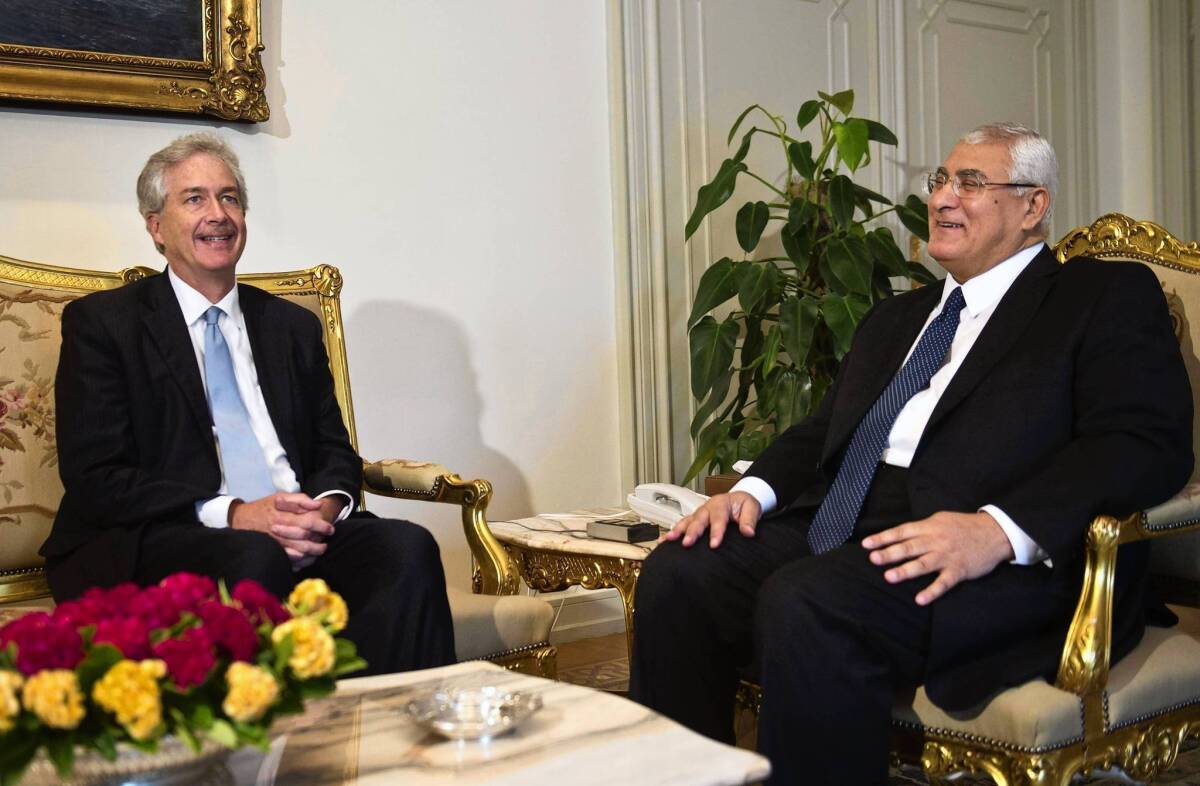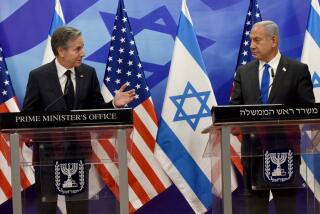In Egypt, U.S. envoy calls for political transition, end to unrest

- Share via
CAIRO — With the Obama administration facing recriminations across Egypt for its response to the July 3 military coup, a top U.S. diplomat began a two-day visit to Cairo on Monday to press for a halt to violence and a swift transition to a new democratic government.
Deputy Secretary of State William J. Burns, the first senior U.S. official to visit since the coup, met with Egypt’s military-backed interim leaders as demonstrators held another large rally on the other side of the city demanding the reinstatement of ousted President Mohamed Morsi.
But in a sign of the breadth of anti-American sentiment, leaders of an ultraconservative Islamist party as well as the organizers of the protests that helped bring down Morsi declined to meet with the U.S. envoy. In separate statements, leaders of both groups criticized Washington’s interference in Egyptian affairs.
U.S. officials spoke by telephone to members of Morsi’s Muslim Brotherhood, but efforts to arrange a face-to-face meeting Monday fell apart over logistical issues, a spokesman for the organization said. The group invited Burns to the site of its massive sit-in in east Cairo, but State Department officials demurred. They asked Brotherhood representatives to come to the U.S. Embassy instead, but with most of its top leaders in military custody or facing arrest warrants, their security couldn’t be guaranteed, said the spokesman, Gehad Haddad.
“It wasn’t a decision,” Haddad said. “The meeting just didn’t take place.”
State Department officials left open the possibility that Burns would meet with Brotherhood representatives before he left Egypt. The organization has boycotted the interim government, which last week introduced a road map for passing an amended constitution and holding fresh parliamentary and presidential elections by early 2014.
In remarks to Egyptian reporters, Burns repeated U.S. calls on the military to end “politically motivated arrests,” a reference to the warrants issued for hundreds of Brotherhood members.
“If representatives of some of the largest parties in Egypt are detained or excluded, how are dialogue and participation possible?” Burns said.
U.S. officials said Burns met with the interim president, Judge Adly Mahmoud Mansour; Vice President Mohamed ElBaradei; Defense Minister Abdel Fattah Sisi; and human rights activists, business leaders and bishops from the Coptic Christian Church, which has been the target of deadly sectarian attacks by suspected Morsi supporters since the coup.
“Egyptians understand that the first priority must be to end violence and incitement, prevent retribution and begin a serious and substantive dialogue among all sides and all political parties,” Burns said.
Egypt is sharply divided between Morsi’s supporters and opponents, and the Obama administration has managed to alienate people on both sides.
Backers of Morsi, who won a narrow majority last year in Egypt’s first free presidential election, say the administration has abandoned democratic principles by recognizing the interim government and refusing to label Morsi’s ouster a coup. Calling it a coup would require the administration to halt the annual $1.3-billion aid package to the Egyptian army that U.S. officials view as crucial to maintaining strategic influence in the Arab world’s largest nation.
Morsi’s opponents, who accused him of running an Islamist dictatorship, have vilified U.S. Ambassador Anne Patterson for comments before the coup that discouraged mass protests and appeared to play down Morsi’s authoritarian tendencies.
In a sign that Morsi supporters could still try to escalate a campaign of civil disobedience, several hundred demonstrators marched into Ramses Square in central Cairo late Monday, blocking traffic and setting small fires. Police officers fired tear gas and birdshot to disperse the crowd, witnesses said.
The U.S. Embassy in Cairo, which was closed to the public for two weeks because of the unrest, reopened Monday but with a warning about the possibility of protests in the area.
Times staff writer Paul Richter in Washington contributed to this report.
More to Read
Sign up for Essential California
The most important California stories and recommendations in your inbox every morning.
You may occasionally receive promotional content from the Los Angeles Times.











